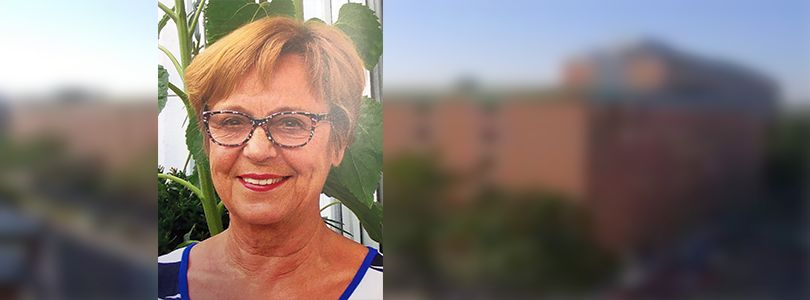Content
Dr. Heidemarie Seidel


„‘If you don’t fight, you’ve to get back into the kitchen’ – I saw this slogan on a sign in early December 1989. This inspired me to co-found the ‘Independent Women’s Association’ in Berlin and to speak up for the interests of working women later at the DPMA.“
Former patent examiner at the AfEP and the DPMA
DPMA:As a food technologist, did you enjoy working at the Office for Inventions and Patents?
Heidi Seidel:Yes. Unlike the German Patent Office (DPA), the AfEP operated under the Ministry of Science and Technology (MWT). The Office had a department called "Scientific and Technical Studies". In this department, for example, we prepared analyses and trend assessments utilising current patent literature to provide the MWT with a decision-making basis on the funding of research institutions and enterprises. For example, I carried out patent studies in the field of synthetic flavourings, enzymes and preservation processes for food production.
DPMA:So how did you experience the years 1989/90?
Heidi Seidel:Those were indeed very exciting times. The fall of the Wall – Thursday, 9 November 1989: The very next day, our head of department, in a hastily convened departmental meeting, required us to report if we had been in the western part of Berlin over the weekend – which nobody took seriously or heeded. We went on with our usual work, naturally with the concern – how much longer, what will come next? In mid-1990 it became clear that there would be a merger of the two German offices. But I was still very worried – there was no department like mine at the German Patent Office (DPA). The GDR food industry was completely outdated. Where should I find a new job, and especially in my mid-40s? I would have worked as a doorman, too, to keep my job. After all, I had two children to care for on my own.
DPMA:You had experienced worries in your job even before.
Heidi Seidel:Oh yes. At the beginning of the seventies, I had had the opportunity to complete a six-month postgraduate course at the University of Helsinki. Among other things, I got to know a family there to whom I felt very close and with whom I had a lively and friendly correspondence to keep in touch. I didn't take the instruction so seriously to avoid any contact with the West in the mid-1970s and in another letter I told my music-loving Finns about a great concert experience in Berlin. This letter and the prompt reply were intercepted.
From one day to the next, though I was still allowed to enter the AfEP, I was no longer allowed to work there. Had I suddenly become an enemy? An already confirmed salary increase and a performance bonus were “frozen”. I was repeatedly summoned to the director’s office, where I was accused of my “misconduct” – the contact with the Finnish family – and had to defend myself. I was also interrogated in a branch office of the Ministry for State Security (MfS). Finally, it was decided that I should be “reformed by working in socialist production”. However, the “prescribed enterprise”, the dairy in Berlin, sent me back to the office, because I was pregnant at that time and was not allowed to work night shifts or do heavy physical labour. So I was “allowed” to remain at the office and was from then on employed to carry out administrative tasks. This also meant further financial losses.
Later I learned that I had probably been picked out to be made an example of: Everyone was meant to see what happened when you maintained contacts with the “Non-Socialist Monetary Area (NSMA)”. Only after my parental leave in 1979 was I allowed to return to my old job. My attempts to find another job started off well, but all of them suddenly failed when the new employer saw my personnel file.
DPMA:Were you concerned that this story might lead to problems for you when the two German offices merged?
Heidi Seidel:Various evaluation meetings took place. These were conducted in an open and objective atmosphere. For the first time, I was able to read my own personnel file. However, in my case, my interviewers from the DPA were surprised because my file was so thin, despite having worked in the office for such a long time: Have we caught a female "IM" (informal collaborator of the State Security) here? Fortunately for me, there were still pieces of paper from torn out pages in my "tattered file". So I was able to prove and explain what had actually happened – and what had come of it.
DPMA:So you went to Munich, too?
Heidi Seidel:Yes, but first I attended an examiner training course in Berlin in the field of agricultural engineering, when it was finally clear that my earlier work would not be continued. Before moving to Munich, I had to set one condition: Because I had no family support whatsoever, I had to move together with my sons and, if possible, at the beginning of the school year. So I came to Munich in early October 1993. Unfortunately, there was no suitable examiner position available for me at that time, but I was warmly welcomed into Department 2, Section 2.2 (IPC revision, search file provision) and I later transferred to Section 1.11 (classification division) and then to Section 1.23 (agricultural technology, process engineering, food technology), where I remained until I retired from my professional life.
DPMA:Was the work as a patent examiner at the DPA different from your past work?
Heidi Seidel:No – there were no major differences at all. What differed most was the work flow: At the AfEP we only had one single search file collection for all examiners. So we marched up and down stairs to the respective search file archive rooms, climbed ladders to reach the search file folders and were always sitting with several people in narrow search rooms…
In Munich, we were naturally astonished at the beginning: Everyone had their own relevant paper search file and relevant technical literature in their individual offices. And – there were colleagues who sorted in the search file, other colleagues who brought new case files and picked up finished work. However, we slowly got the hang of working at the DPA in Munich and only silently smiled at the increase in bureaucracy. Never could we have imagined, in the past, that the AfEP could be surpassed in this respect.
DPMA:From 1994 to 2011 you were also deputy equal opportunities officer at the DPMA. How did this come about?
Heidi Seidel:: This brings us back to my involvement in the “Independent Women’s Association Berlin” during the period of reunification. At the beginning of December 1989, I followed the founding call “If you don’t fight, you’ve to get back into the kitchen”. I took part in the first “round table talks” and was also a candidate for the first free elections in March 1990, which is why it was important to me to become also involved in promoting the interests of working women at the DPMA.
With around 50 per cent female examiners, the AfEP had a significantly higher proportion of women at least among non-executive staff than the DPA. At the time of my transfer in 1993, there were hardly any female examiners at the DPA. But – women in senior positions? There were hardly any to be found at the AfEP and at the DPA! And – measures or institutions to better reconcile work and family life? Far from it!
DPMA:And today?
Heidi Seidel:Since the first official election of an equal opportunities officer at the DPMA in 1995 (in 1994 the civil service was required by law to appoint women's representatives), a lot has happened in terms of gender equality. As the elected deputy equal opportunities officer between 1995 and 2011, I actively and fearlessly advocated this issue and sometimes I caught myself thinking – to myself: “It was a good thing that I had to stay at the AfEP back then”.
Last updated: 10 December 2025

Not only protecting innovations
Social Media